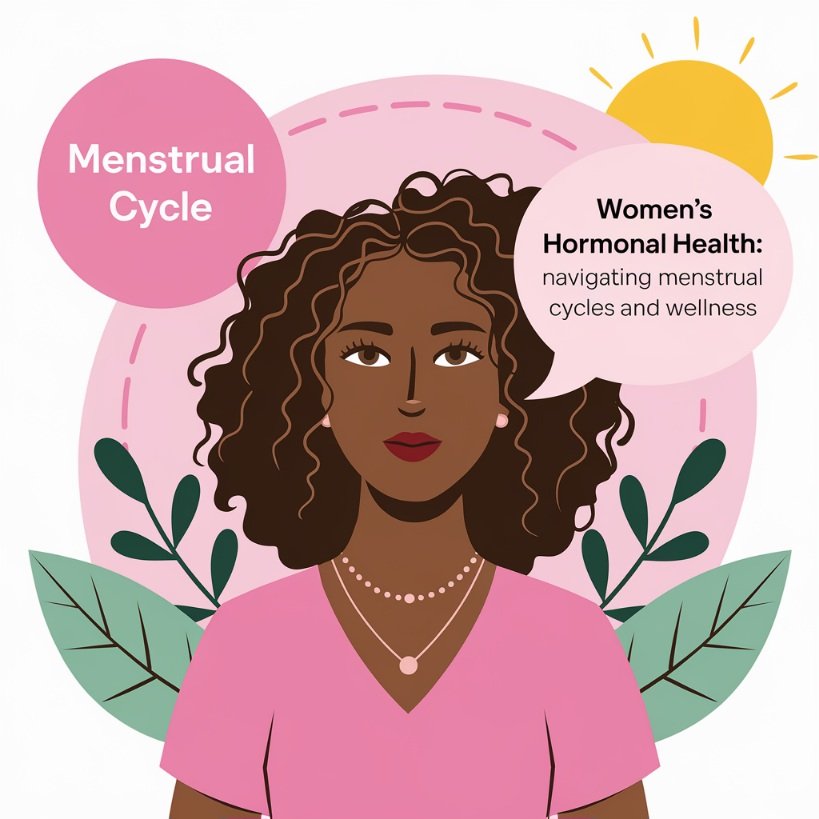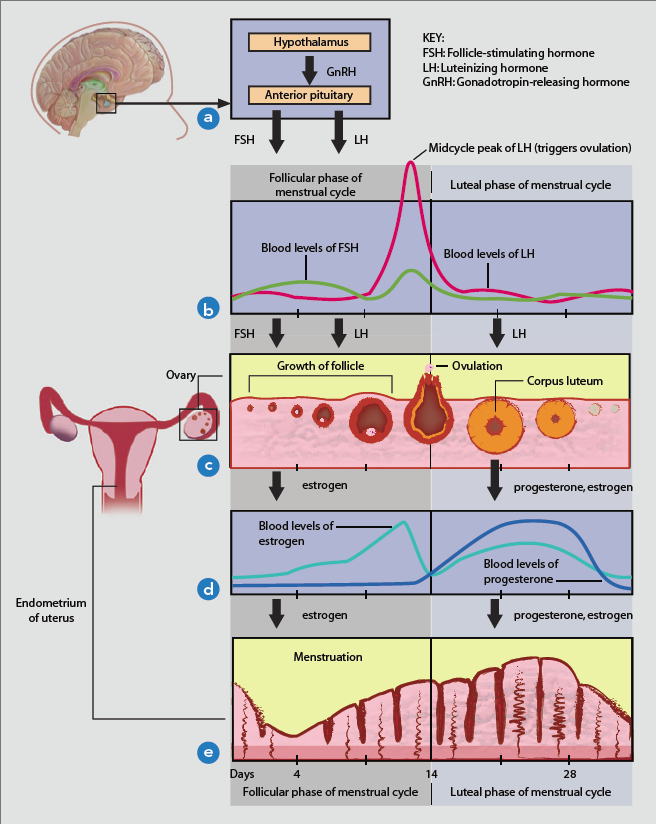"Women's Hormonal Health: Navigating Menstrual Cycles and Wellness"
Women's Hormonal Health: Navigating Menstrual Cycles and Wellness
Women's hormonal health plays a vital role in overall wellness, influencing menstrual cycles, mood, energy levels, and reproductive health. As a Traditional Naturopath and Functional Diagnostic Nutrition® Practitioner, I take a holistic and investigative approach to identifying and addressing the root causes of hormonal imbalances. Combining this with a whole food plant-based (WFPB) diet offers a powerful and natural strategy to optimize hormonal health. This article explores how a WFPB diet, personalized assessments, and integrative lifestyle tools such as cycle trackers can support women in navigating their menstrual cycles and achieving optimal wellness.
Understanding the Menstrual Cycle
The female cycle begins with the follicular phase. During this phase, the brain releases FSH (Follicle-stimulating hormone) which stimulates the growth of ovarian follicles. As these follicles mature, they produce estrogen, leading to increased estrogen levels in the body. At this stage, estrogen levels should be higher than progesterone levels. As estrogen secretion continues to rise, FSH levels start to decline, and LH (Luteinizing hormone) is released. This culminates in a sharp rise in estrogen, a surge of LH, and a small burst of FSH, resulting in the release of the mature egg. This marks the transition to the luteal phase, where the corpus luteum forms around the egg and releases small amounts of estrogen and predominantly progesterone.
The menstrual cycle is regulated by a complex interplay of hormones, mainly estrogen and progesterone. It typically lasts around 28 days but can range from 21 to 35 days. The cycle is divided into four phases:
Understanding the menstrual cycle phases
1. Menstrual Phase (Days 1-5): The uterine lining is shed, resulting in menstrual bleeding.
2. Follicular Phase (Days 1-13): This phase overlaps with menstruation and involves the maturation of ovarian follicles and a rise in estrogen, thickening the uterine lining.
3. Ovulation (Day 14): A surge in Luteinizing Hormone (LH) triggers the release of an egg from the dominant follicle.
4. Luteal Phase (Days 15-28): The ruptured follicle forms the corpus luteum, which produces progesterone to prepare the uterine lining for potential pregnancy. If fertilization does not occur, progesterone levels fall, leading to menstruation.
Using Cycle Trackers to Understand Hormonal Health
Incorporating cycle tracking tools is a practical way to monitor and understand menstrual health. Trackers such as Natural Cycles° and the Oura Ring can help identify patterns, hormonal shifts, and potential imbalances.
Benefits of Cycle Tracking
🫴🏾 Identifying Patterns and Imbalances: Observe irregularities such as delayed ovulation or inconsistent cycles, which may indicate hormonal imbalances.
🫴🏾 Optimizing Lifestyle Choices: Adjust nutrition, exercise, and stress management strategies to align with different phases of the cycle.
🫴🏾 Enhanced Fertility Awareness: Provide a natural, hormone-free method to determine fertile windows for those seeking to conceive or avoid pregnancy.
🫴🏾 Improved Symptom Management: Highlight correlations between hormonal fluctuations and lifestyle factors, offering actionable insights for symptom relief.
Overview of Key Trackers
🫴🏾 Purpose: A digital fertility and birth control tracker.
🫴🏾 Features: Uses basal body temperature (BBT) to predict ovulation and fertile days.
🫴🏾 Benefits: Hormone-free, FDA-cleared, and ideal for natural contraception or detailed cycle monitoring.
Oura Ring:
🫴🏾 Purpose: A wearable health tracker monitoring physiological markers like body temperature, heart rate variability, and sleep.
🫴🏾 Features: Tracks temperature trends to indicate cycle phases, predict ovulation, and identify disruptions.
🫴🏾 Benefits: Combines cycle tracking with broader wellness insights, helping users understand the impact of sleep, stress, and activity on hormonal health.
By using these tools, women can develop a deeper understanding of their bodies, empowering them to make informed decisions to support overall well-being. To help you get started, download our free Period Preparation Self-Care Checklist and take the first step toward a healthier cycle.
A Holistic Approach to Women's Hormonal Health: Balancing Menstrual Cycles with Naturopathy and Functional Diagnostic Nutrition® and a Whole Food Plant-Based Diet
Traditional Naturopaths and FDN practitioners use a holistic and investigative approach to hormonal health, focusing on identifying and addressing root causes of imbalances. Combining this approach with a WFPB diet enhances the body's ability to maintain hormonal balance naturally.
Comprehensive Assessment in FDN
Functional Diagnostic Nutrition® practitioners start with a thorough health assessment, combining medical history, lifestyle, and lab tests. This comprehensive evaluation helps tailor a specific approach for each woman, focusing on balancing hormonal health naturally. For menstrual health and overall wellness, the following functional labs play an integral role:
Key Functional Lab Tests
DUTCH Test (Dried Urine Test for Comprehensive Hormones): This test evaluates adrenal and sex hormones, including estrogen, progesterone, testosterone, cortisol, and melatonin. It is especially important for understanding the balance of estrogens (E1, E2, E3) and their metabolites, which influence menstrual cycles, PMS, fertility, and perimenopausal symptoms.
DNALife Estrogen and Health Test: A genetic test identifying variations in estrogen metabolism and detoxification pathways to address hormonal imbalances like estrogen dominance and PMS, guiding personalized wellness strategies.
Comprehensive Thyroid Panel: Hormonal imbalances can stem from thyroid dysfunction. Testing for TSH (Thyroid-Stimulating Hormone), Free T3 (Triiodothyronine, Free T4 (Thyroxine), reverse T3 (rT3), and thyroid antibodies [TPO (Thyroid Peroxidase Antibodies) and TgAb (Thyroglobulin Antibodies)] helps assess thyroid health, which impacts metabolism, menstrual regularity, and energy levels.
GI-MAP (Gastrointestinal Microbial Assay Plus): The GI-MAP stool test assesses gut health, which is crucial for hormone metabolism and detoxification. Gut dysbiosis, infections, and inflammation can affect estrogen balance and lead to symptoms like bloating, acne, and heavy periods. Proper gut function supports estrogen clearance, reducing estrogen dominance.
Micronutrient Testing: This test evaluates vitamin and mineral levels essential for hormone production and regulation. Deficiencies in magnesium, zinc, B vitamins (especially B6, B12, and folate), and vitamin D can lead to PMS, menstrual irregularities, and fatigue.
Comprehensive Metabolic Panel (CMP): This test provides a general overview of organ function, glucose regulation, and electrolyte balance, all of which are critical for maintaining hormonal homeostasis.
The Traditional Naturopathic and Functional Diagnostic Nutrition® Approach with a WFPB Diet
Benefits of a Whole Food Plant-Based Diet
A Whole Food Plant-Based (WFPB) diet can offer numerous benefits for women's hormonal health, particularly in managing the menstrual cycle. This approach emphasizes unprocessed, plant-based foods, which are naturally rich in essential nutrients that support hormone regulation. Some key benefits include:
Improved Estrogen Metabolism:
High-fiber diets help in the elimination of excess estrogen through the digestive system, reducing the risk of estrogen dominance, which is linked to PMS, heavy menstrual bleeding, and even conditions like fibroids or endometriosis.
Anti-inflammatory Properties:
Plant-based diets, rich in antioxidants, phytonutrients, and omega-3 fatty acids (found in flaxseeds, chia seeds, and walnuts), can reduce systemic inflammation, which is often associated with painful periods and hormonal imbalances.
Blood Sugar Regulation:
Whole grains, legumes, and vegetables provide complex carbohydrates that help stabilize blood sugar levels. Balanced blood sugar is crucial for maintaining steady energy levels throughout the menstrual cycle and preventing mood swings or irritability.
Support for Mitochondrial Function:
Mitochondrial health is critical for energy production and hormone synthesis. A nutrient-dense, plant-based diet can provide the necessary vitamins and minerals (e.g., B vitamins, magnesium, and iron) needed to support healthy mitochondrial function, thus reducing fatigue and improving overall energy, especially during menstruation.
Fun Fact
A fun fact about women on a whole food plant-based diet is that studies have shown it can have significant health benefits, including reducing the risk of heart disease, improving blood sugar control, and promoting healthy weight management. Plant-based diets are rich in fiber, vitamins, and antioxidants, which can support overall well-being and longevity.
Personalized Nutrition and Dietary Strategies
In Traditional Naturopathy and Functional Diagnostic Nutrition® (FDN), personalizing nutrition is key to addressing individual hormonal needs. Women have varying hormonal landscapes depending on factors like age, stress, and overall health, so the WFPB diet must be tailored to these factors:
🌿 Cycle-Specific Nutrition:
Nutritional needs vary throughout the menstrual cycle. For example, during the follicular phase, focus on foods rich in phytoestrogens (e.g., flaxseeds, soy) that can support healthy estrogen levels. In the luteal phase, which can often be characterized by PMS symptoms, increasing magnesium-rich foods (like leafy greens, seeds, and nuts) can help ease cramps and mood disturbances.
🌿 Addressing Nutrient Deficiencies:
Women may be more prone to deficiencies in iron, calcium, and vitamin D due to menstrual blood loss. Incorporating plant-based sources of these nutrients, such as lentils, tofu, and fortified plant milks, is essential for maintaining bone health and preventing fatigue. Supplementing with B12 and omega-3s may also be necessary for those on strict WFPB diets.
🌿 Gut Health Focus:
A healthy gut microbiome is linked to balanced hormone production and metabolism. Fermented foods like sauerkraut, kimchi, and miso, along with prebiotic-rich foods like garlic, onions, and asparagus, can enhance gut health and in turn support hormone balance.
🌿 Supporting Detoxification:
Cruciferous vegetables (e.g., broccoli, kale, cauliflower) contain compounds that support liver detoxification pathways, helping to metabolize and excrete excess hormones. Detoxification is a crucial part of managing hormonal imbalances related to PMS or other menstrual disorders.
Lifestyle Modifications
In addition to dietary changes, lifestyle interventions play a significant role in managing hormonal health. While stretching is often recommended, there are other impactful strategies that can complement a WFPB diet:
Stress Management through Mindfulness and Meditation:
Chronic stress can lead to dysregulated cortisol levels, which interfere with reproductive hormones. Implementing mindfulness techniques, meditation, or even deep-breathing exercises can help reduce stress and cortisol levels, promoting hormonal balance.
Sleep Optimization:
Poor sleep affects hormone production, including melatonin and cortisol, and can worsen PMS symptoms. Ensuring adequate, quality sleep (8-10 hours per night) by establishing a regular sleep routine, reducing blue light exposure before bed, and creating a calming pre-sleep ritual can aid in hormonal balance.
Strength and Resistance Training:
Physical exercise, particularly resistance training, can help regulate insulin levels, support metabolic health, and reduce PMS symptoms. Weight-bearing exercises also improve bone density, which is crucial for women, especially as they age and face changes in estrogen levels that impact bone health.
Environmental Toxin Reduction:
Exposure to endocrine-disrupting chemicals (EDCs) in plastics, cosmetics, and cleaning products can interfere with hormone function. Reducing exposure by choosing natural, non-toxic personal care products and avoiding plastic containers for food and drink storage can help support hormonal balance.
Key Supplements for Women’s Hormonal Health
Based on common patterns seen in women’s hormonal health and whole food plant-based diets, targeted supplementation may include:
🌿 Magnesium (Bioptimizer Magnesium Breakthrough)
Magnesium is crucial for the enzymatic processes that support hormonal balance, reduce cramping, and alleviate PMS symptoms. It also plays a key role in stress reduction, which can help manage cortisol levels.
🌿 Omega-3 Fatty Acids (Algae-based DHA/EPA)
For those on plant-based diets, algae-based omega-3 supplements can support hormonal health, reduce inflammation, and promote balanced prostaglandin production, essential for easing menstrual discomfort.
🌿 B-Complex Vitamins (Designs for Health)
B vitamins, particularly B6, support progesterone production and balance estrogen metabolism. B12 and folate are essential for cellular energy and methylation, often needed in plant-based diets since they can be deficient.
🌿 Adaptogens (Ashwagandha from Cellcore)
Adaptogenic herbs like ashwagandha help balance the adrenal glands, supporting cortisol regulation. This, in turn, helps manage menstrual irregularities, improve energy, and reduce stress-related hormonal imbalances.
🌿 Vitamin D3 with K2 (Designs for Health)
Vitamin D is critical for modulating the immune system, supporting progesterone production, and enhancing mood regulation. Since plant-based diets can sometimes lack adequate vitamin D, supplementation is key, particularly when lab tests indicate a deficiency.
🌿 Zinc (Zinc Picolinate by Thorne)
Zinc is vital for ovulation and supports the luteal phase of the menstrual cycle. It is also necessary for immune function and healthy skin, often needing to be supplemented in a plant-based diet.
🌿 Evening Primrose Oil or Borage Oil (Plant-based options)
These oils are rich in gamma-linolenic acid (GLA), an omega-6 fatty acid that supports estrogen balance and may reduce symptoms of PMS, like breast tenderness and bloating.
Supporting Detox Pathways
Estrogen dominance is a common issue in hormonal imbalance, where the body has too much estrogen relative to progesterone. To support estrogen detoxification:
🌿 DIM (Diindolylmethane) from Thorne or Integrative Therapeutics supports the liver’s ability to metabolize and excrete excess estrogen.
🌿 Liver Support (Milk Thistle, Dandelion Root): from Cellcore or Gaia Herbs offers liver-supporting herbs to enhance estrogen detoxification.
Where to buy:
International- KXCTGG
Case Study: Holistic Approach to PCOS with a WFPB Diet
Consider Anna, a 28-year-old woman diagnosed with Polycystic Ovary Syndrome (PCOS). She experiences irregular periods, weight gain, and acne. An FDN approach with a WFPB diet would involve:
Comprehensive Testing: Assessing insulin levels, androgens, thyroid function, and inflammatory markers.
Personalized Nutrition: Implementing a low-glycemic, anti-inflammatory WFPB diet to manage insulin resistance and reduce inflammation.
Targeted Supplements: Using inositol to improve insulin sensitivity, and omega-3 fatty acids to reduce inflammation.
Lifestyle Modifications: Incorporating stress reduction techniques, regular moderate exercise, and improving sleep hygiene.
Ongoing Support: Regular follow-ups to adjust the plan based on symptom improvements and test results.
Conclusion
A whole food plant-based diet, integrated with the principles of Traditional Naturopath and Functional Diagnostic Nutrition®, offers a personalized and holistic approach to women's hormonal health. By focusing on comprehensive assessments, individualized nutrition, targeted supplementation, and lifestyle modifications, FDN practitioners help women navigate their menstrual cycles and achieve optimal hormonal balance. Whether dealing with common menstrual issues or more complex conditions like PCOS and endometriosis, this combined approach provides a natural and effective pathway to lasting wellness. If you want to hire a Functional Diagnostic Nutrition® Practitioner to help you with your menstrual cycle do so today! Take advantage of our Complimentary Discovery Call 🤙🏾 today!
Citations:
1. Benefits of a Whole Food Plant-Based Diet:
Whole food plant-based diets are rich in fiber, phytonutrients, and antioxidants, which help balance hormones, reduce inflammation, and improve metabolic health【42】【43】【44】.
They also support gut health and estrogen detoxification through fiber-rich foods like leafy greens, flaxseeds, and whole grains【42】【44】.
Sources:
Purely Planted: 7 Plant-Based Foods for Hormonal Balance
Cleveland Clinic: What You Should Know About Plant-Based Diets
https://health.clevelandclinic.org
Plant-Based Mavens: Plant-Based Diet Benefits for Women
2. Personalized Lab Testing (DNALife Estrogen and Health Test):
This genetic test evaluates pathways for estrogen metabolism and detoxification, helping to address hormonal imbalances such as estrogen dominance. It provides actionable insights for tailoring dietary and lifestyle interventions【42】【44】.
3. Using Cycle Trackers:
Tools like Natural Cycles and Oura Ring provide personalized insights into menstrual patterns and hormonal shifts, empowering women to optimize lifestyle strategies. These tools also assist in fertility tracking and symptom management【42】【43】.
Sources:
Purely Planted: 7 Plant-Based Foods for Hormonal Balance
Cleveland Clinic: What You Should Know About Plant-Based Diets
https://health.clevelandclinic.org
4. Key Supplements and Nutritional Focus:
The inclusion of nutrients like magnesium, omega-3s, and B-complex vitamins supports hormonal balance and addresses deficiencies common in plant-based diets. Evidence suggests that omega-3s reduce inflammation, while magnesium alleviates PMS symptoms【43】【44】.
Sources:
Cleveland Clinic: What You Should Know About Plant-Based Diets
https://health.clevelandclinic.org
Plant-Based Mavens: Plant-Based Diet Benefits for Women
DISCLAIMER. The health information in this blog are for general education and is not intended to substitute for any medical advice. No medical cure, diagnosis, or treatment is provided.
This website contains affiliate links, which means LTL may receive a percentage of any product or service you purchase using the links in the items descriptions, articles or advertisements. You will pay the same price for all products and services, and your purchase helps support our ongoing effort in assisting you. Thanks for your support!
✨ Unlock expert wellness insights! 🌿 Subscribe now for exclusive health tips & natural living secrets! 🌱💪🏾



